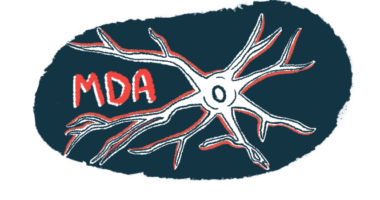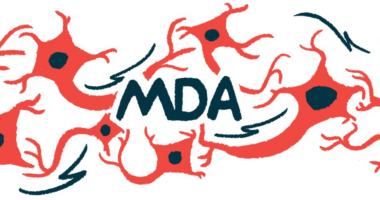SMA gene therapy being tested in mice improves their motor function
EXG001-307 appears to have better safety profile than approved gene therapy

An investigational gene therapy that targets nerve cells thats’s being developed by Exegenesis Bio was well tolerated and improved motor function in a mouse model of spinal muscular atrophy (SMA), a study shows.
Based on the data, EXG001-307 seems to have a better safety profile than the approved SMA gene therapy Zolgensma (onasemnogene abeparvovec) and shows fewer adverse effects on the animals’ hearts. This let it be given at higher doses, which led to significantly superior survival rates.
“EXG001-307 is a promising gene therapy for SMA, offering a targeted, safer, and more effective alternative to existing treatments,” the study’s researchers wrote. The study, “Efficacy and preliminary safety assessment of EXG001-307 AAV gene therapy for spinal muscular atrophy,” was published in Molecular Therapy, Methods & Clinical Development.
SMA is caused by mutations in the SMN1 gene that result in little or no production of the SMN protein. Because the protein is important in motor neurons’ function and maintenance, reduced SMN levels lead to the loss of these specialized nerve cells, which control voluntary movement, resulting in SMA symptoms.
Only three therapies are approved for treating SMA. Two that require frequent and burdensome dosing, but the third, Zolgensma, is a gene therapy that’s administered as a single infusion into the bloodstream. It has, however, exhibited toxic effects on the heart and liver, and some patients have died due to acute liver failure.
EXG001-307 was developed to address some of these issues. Like Zolgensma, the therapy uses a modified, harmless adeno-associated virus (AAV) to deliver a working version of the SMN1 gene. But it contains a specific region, called a promoter, that is specific to nerve cells, meaning the gene is highly active in neuronal tissue and less protein is produced in other tissues. This should improve its safety.
Results of EXG001-307 treatment
In a study led by researchers at Exegenesis, multiple doses of their gene therapy were tested in an animal model of SMA and compared with another gene therapy identical to Zolgensma, which served as the control treatment. Both therapies were given as a single intravenous injection into the temporal vein within the first two days of birth.
Both EXG001-307 and the control treatment increased body weight and extended survival across various doses over untreated animals. Only EXG001-307 showed dose-dependent benefits, however, with the highest dose leading to the greatest benefits. The animals given this dose, 400 trillion vector genomes (vg) per kg, survived for a median of 191 days and a maximum of 319 days. The mice given the control therapy benefitted most from an intermediate dose of 200 trillion vg/kg, indicating its highest dose could lead to safety concerns. Even with that intermediate dose, animals lived for a median of 32.5 days and a maximum of 124.
The animals showed significant gains in motor function, strength, and coordination with both therapies compared with no treatment, but the effects were generally seen earlier with EXG001-307.
EXG001-307 also led to a similar number of gene copies as Zolgensma in the heart, but overall SMN levels were much lower in the heart of EXG001-307-treated animals, indicating its promoter was working as intended.
The investigational therapy was also well tolerated in healthy mice at all the doses tested, and tissue analyses showed it led to significantly reduced signs of heart tissue damage and liver toxicity over the control therapy.
While no animals died due to EXG001-307, even at very high treatment doses, 41 mice that received the reference therapy died or became moribund within 12 weeks, with 40 deemed related to the treatment.
“These findings highlight EXG001-307’s potential to address the safety limitations of current SMA gene therapies” and “offer strong proof-of-concept for EXG001-307 as a viable gene therapy for SMA,” the researchers wrote.
The treatment has been tested in children with SMA type 1 in an open-label Phase 1/2 clinical trial (NCT05614531). Data shared last year showed the treatment iss well tolerated and leads to significant gains in motor development.
“These results support the continued clinical development of EXG001-307 as a safer and more effective gene therapy for SMA, with ongoing clinical trials … expected to confirm its therapeutic potential,” the researchers wrote.








